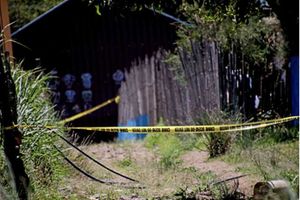
Uninspected meat from sick and dying animals is being sold in butcheries, eateries, and schools, posing severe health risks.
The government has raised the red flag on the safety of meat children consume in learning institutions and what is sold in butcheries and eateries.
This follows the revelation that unscrupulous traders are selling meat from sick and dying animals.
The traders purchase ailing livestock from farmers, slaughter them at abattoirs under the cover of darkness, and transport the uninspected meat to various destinations for public consumption.
A two-month crackdown led by a multi-agency team in the South Rift counties of Narok and Bomet has resulted in the arrest of eight suspects and impounded more than 20 sick animals.

A sick cow that whose owner was arrested while transporting five heads of cattle for slaughter in Bomet, is seen here while detained at the Bomet police station on August 13, 2024.
Dealers arrested
Some of these animals died shortly after the police impounded them, while others perished en route to slaughterhouses.
Saturday Nation discovered that a slaughterhouse in Mulot Central, Narok County—previously shut down five years ago for similar offences—was closed again after being linked to the illegal trade two weeks ago.
Investigations revealed that the meat from these animals was being sold not only in Bomet and Narok but also in Nakuru and Nairobi, according to arrested dealers.
Ongoing crackdown
The illicit trade has reportedly infiltrated learning institutions where uninspected meat is sold to boarding primary and secondary schools, as well as tertiary institutions.
One suspect revealed that this trade continues with the full knowledge of some government officers, despite ongoing crackdowns.
“It is difficult to eradicate the vice despite the ongoing crackdown. The players will remain the same with the full knowledge of government officers,” one dealer confessed during interrogation.
The traders are exploiting weak points in the system by bribing officials at police roadblocks, allowing the transport of sick and dying animals in broad daylight.
Bomet County chief officer for health and medical services Felix Langat yesterday confirmed that authorities had closed the Mulot slaughterhouse following a joint operation with Narok officials.
The facility had long been notorious for its foul stench, which commuters on the Narok-Bomet highway often noticed.
The crackdown has extended to other areas, including Ndanai, Siongiroi, Chebole, Sachang’wan, and Mulot in Bomet, as well as Ololulunga, Mambo Leo, Transmara, and Narok West in Narok, which served as hubs for the illicit trade.
The official expressed concerns about the health risks posed to learners and the public, emphasising the lack of proper meat inspection at institutions.
“Institutions with thousands of students require large quantities of meat, making them easy targets for the illegal trade.
“Also, nurses and matrons in schools cannot detect unfit meat,” he said.
He revealed that dealers arrested in the crackdowns admitted to buying sick or dying animals for as little as Sh2,000, with a ready market for the unfit meat in local and neighbouring counties.
The supply chain is reportedly well-established, with traders convincing farmers that the animals are being purchased for dog breeders in urban centres.
However, the meat ends up on plates in schools and restaurants.
Saturday Nation established several of the animals impounded by authorities were undergoing treatment for various diseases at the time of their confiscation.
Following post-mortem examinations, these animals were buried by public health and veterinary officers, though the results of the tests have yet to be disclosed.

Bomet Central’s acting Sub County Police Commander Bashir Mohamed during the interview at his office on August 13, 2024.
Bomet Central’s acting Sub County Police Commander Bashir Mohamed said a multi-agency team had been conducting stringent checks along highways to intercept vehicles transporting sick animals.
He revealed that some butchery operators have also been selling uninspected meat to consumers, exposing them to significant health risks.
Security meetings
County commissioners Kipkech Lotiatia of Narok and his Bomet counterpart Ahmed Omar have spearheaded joint security meetings to address the issue, acknowledging that the traders operate with near impunity despite past enforcement efforts.
Public health officials are now urging farmers not to sell sick animals to traders but to follow proper veterinary procedures, including slaughtering and burying the animals as required by law.
Public health
Dr Omar and Mr Lotiatia have reiterated that the government will not compromise on public health and will take strong action against those involved in the illegal meat trade.
“We are narrowing down on the dealers to arrest and prosecute them. We are also sensitising livestock owners not to sell sick and dying animals, but instead slaughter and bury them as required by the veterinary services officers and public health department,” said Mr Bashir.
Bomet’s chief officer for agriculture, livestock, and fisheries, Kibet Sitienei, stressed that uninspected meat poses severe health risks to consumers.
“The people buying and eating this meat do not know the danger they are exposing themselves to,” said Dr Sitienei, adding that public vigilance is critical in reporting suspicious activities to authorities.
Dying animals
The crackdown has prompted inspections of abattoirs in the South Rift region as the government seeks to determine whether these facilities have been complicit in the sale of sick and dying animals.
Bomet County director of veterinary services, Wilson Serem, warned that slaughtering sick animals poses severe risks to human health, particularly when animals under treatment for zoonotic diseases like anthrax or rabies are involved.
He emphasised that strict withdrawal periods should be observed before slaughtering animals that have been treated with medications.
Authorities are also targeting butcheries believed to be working in concert with the illicit traders.
Low prices
Notably, a slaughterhouse in Sachang’wan, Bomet Central, has garnered a reputation for allowing the processing of sick or dead animals for sale in local markets.
Farmers in the region, particularly those with sickly animals, have been targeted by these traders, who purchase the animals at low prices and transport them cruelly, often tied down in vehicles.
Dr Serem called for increased vigilance among the public, urging them to report suspicious transactions to prevent the further spread of this dangerous practice.
Animals with serious lumpy skin diseases are bought by the traders in livestock auction yards across the two counties and, instead of being treated, driven to slaughterhouses.







